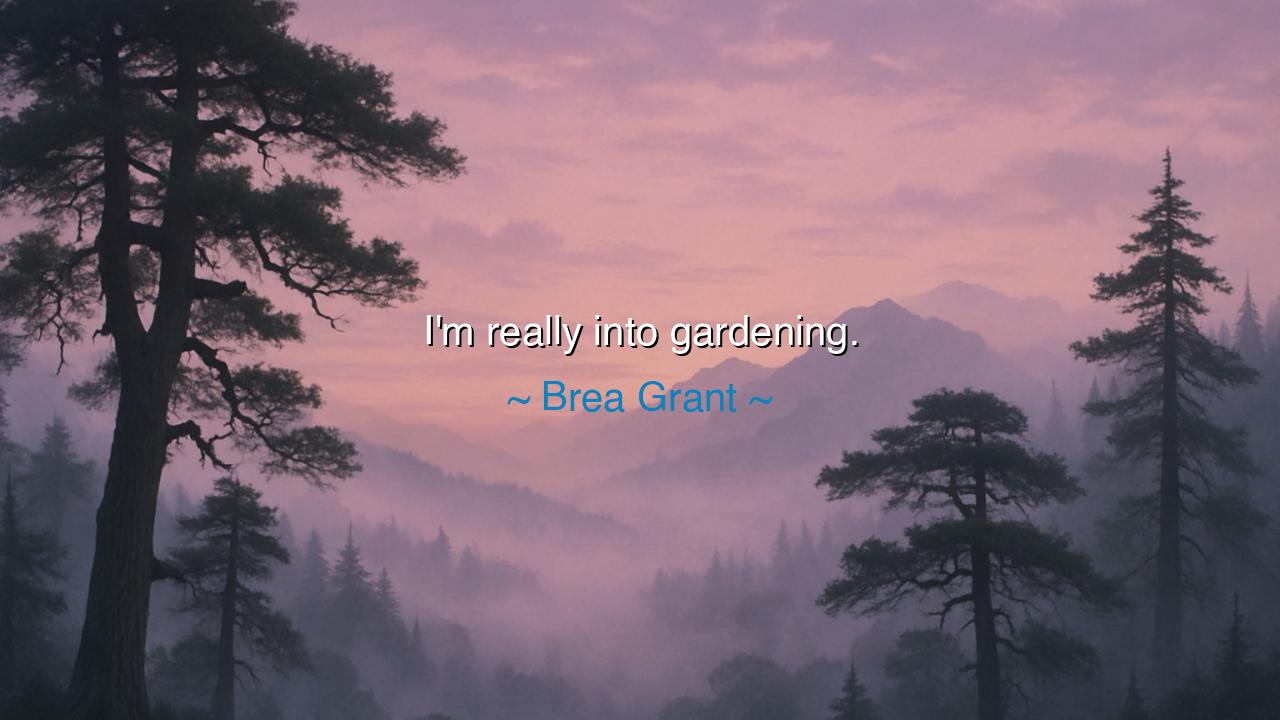
I'm really into gardening.






“I’m really into gardening.” — these few, unassuming words spoken by Brea Grant, actress, writer, and creator, conceal within their simplicity a deep and timeless truth. To the hurried ear, they may sound casual, even mundane. Yet beneath their surface rests an ancient rhythm — the pulse of creation, patience, and renewal that has called to humankind since the dawn of time. When one declares a love for gardening, one is not merely speaking of a pastime, but of a sacred practice: the tending of life, the partnership between earth and spirit, and the quiet defiance of chaos through care and cultivation.
The origin of this quote lies not in grandeur but in the modern struggle for balance. Brea Grant, known for her work in film and storytelling, has lived in the worlds of imagination — places of intensity, pressure, and constant creation. Yet, like many artists before her, she found in the soil a gentler kind of creativity — one that does not demand performance, but patience. “I’m really into gardening,” she says, and in that statement, we glimpse a return to stillness, a reaching for something pure. The screen fades, the lights dim, and there, among the plants and sunlight, she finds again the rhythm of life unhurried by human urgency.
In this, she stands in a long lineage of seekers who found their peace among the growing things. The ancients understood this well. The philosopher Epicurus, from whom we gain the word Epicurean, established his “Garden” not as a place of indulgence, but of wisdom. There, his followers gathered to discuss virtue, friendship, and the good life amid the quiet hum of nature. They believed that happiness grew best in simplicity, that the garden — humble, green, alive — was the perfect image of the soul in harmony. To be “into gardening,” then, is to participate in this ancient pursuit of peace, to turn away from the noise of the world and cultivate serenity one leaf, one blossom, one seed at a time.
To garden is to act with faith. You place a seed in the earth — a tiny, fragile thing — and you trust that, unseen beneath the soil, life is stirring. The gardener cannot rush this process; they can only water, wait, and believe. And is this not a mirror of our own existence? We plant efforts, hopes, and dreams into the unknown, uncertain if they will ever bloom. But the lesson of the earth is steadfast: growth takes time, and beauty demands patience. When Brea Grant tends her garden, she is not only nurturing plants; she is practicing the discipline of trust — the art of believing that good things grow, even in silence, even in darkness.
Consider the story of George Washington Carver, born into bondage yet destined to transform the land itself. Through his devotion to plants and soil, he discovered hundreds of uses for the peanut and sweet potato, restoring fertility to fields ruined by greed and ignorance. Carver, like Grant, was “into gardening,” but his gardening was also his ministry. He saw in each plant a message from the Creator, and through his quiet care, he healed both the earth and the hearts of those who depended upon it. His life reminds us that tending the earth is not a small act — it is a service to creation, a work of humility and reverence that ripples far beyond the garden gate.
But there is another truth in Brea Grant’s words — one that speaks to the modern soul. To say “I’m really into gardening” is also to declare an act of resistance. In an age ruled by speed, consumption, and disconnection, to pause and plant is to rebel against the frenzy. The garden asks us to slow down, to listen, to reconnect with what sustains us. The smartphone, the screen, the calendar — these command us to hurry. But the soil whispers: “Be still. Life will come when it is ready.” In her gardening, Grant aligns herself not with the machines of time, but with the eternal cycles of nature — a wisdom older than any civilization.
So, my child, learn from her simplicity. When you hear the words, “I’m really into gardening,” do not dismiss them as small talk, but as a gentle revelation of how to live well. Find your own garden — it may be a patch of earth, a windowsill, or even the soil of your spirit. Plant something, nurture it, and let it teach you patience, humility, and joy. When life grows weary, go to the garden — touch the leaves, breathe the air, listen to the bees — and remember that you, too, are part of this living world.
For in the end, gardening is not merely about growing plants; it is about growing peace. It is about remembering that creation continues, even when the world feels broken. And as Brea Grant reminds us through her quiet devotion, to love the garden is to love life itself — in all its cycles, its struggles, and its miracles. So tend your garden well, for in its care lies the secret to harmony — the truth that beauty and hope, once planted, can always bloom again.






AAdministratorAdministrator
Welcome, honored guests. Please leave a comment, we will respond soon